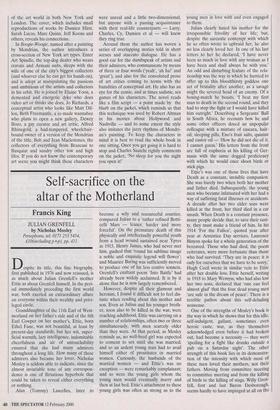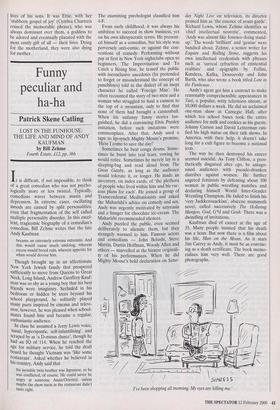Self-sacrifice on the altar of the Motherland
Francis King
JULIAN GRENFELL by Nicholas Mosley Persephone, tel: 0171 253 5454, £10(including p+p), pp. 411 Despite its title, this fine biography, first published in 1976 and now reissued, is as much about Julian Grenfell's mother Ettie as about Grenfell himself. In the peri- od immediately preceding the first world war, both exerted an extraordinary allure on everyone within their wealthy and privi- leged circle.
Granddaughter of the 11th Earl of West- morland on her father's side and of the 6th Earl Cowper on her mother's, Ettie, born Ethel Pane, was not beautiful, at least by present-day standards; but her wit, super- ficial warmth, lazy intelligence, indomitable cheerfulness and air of untouchability ensured that she had many admirers throughout a long life. How many of these admirers also became her lover, Nicholas Mosley is seldom able to indicate, since the almost invariable tone of any correspon- dence is one of flirtatious hyperbole that could be taken to reveal either everything or nothing.
Alan (Tommy) Lascelles, later to become a wily and resourceful courtier, compared Julian to a 'rather refined Botti- celli Mars — leaner, harder and more forceful'. On the premature death of this physically and intellectually powerful youth from a head wound sustained near Ypres in 1915, Henry James, who had never met him, gushed that 'round his sublime image a noble and exquisite legend will flower'; and Maurice Baring was sufficiently moved to produce one of his less costive sonnets. Grenfell's exultant poem 'Into Battle' had already been widely acclaimed. It is by it alone that he is now largely remembered.
However, despite all their glamour and heroism, I found it difficult not to feel dis- taste when reading about this mother and son. Even as Julian and his younger broth- er, soon also to be killed in the war, were reaching adulthood, Ettie was carrying on a number of relationships, often two or three simultaneously, with men scarcely older than they were. At that period, as Mosley reminds us, no well-bred girl was expected to consent to sex until she was married; and so an ardent young man had to avail himself either of prostitutes or married women. Curiously, the husbands of the married women — and Ettie's was no exception — were remarkably complaisant; and so were the young girls whom the young men would eventually marry and then at last bed. Ettie's attachment to these young girls was often as strong as to the young men in love with and even engaged to them.
Julian clearly hated his mother for the irresponsible frivolity of her life; but, despite the sarcastic contempt with which he so often wrote to upbraid her, he also no less clearly loved her. In one of his last letters to her he declared, 'I have never been so much in love with any woman as I have been and shall always be with you.' An odd and disturbing feature of the rela- tionship was the way in which he hurried to offer up to this bloodthirsty goddess one act of brutality after another, as a savage might the severed head of an enemy. Of a boxing-match he boasts, 'I beat my first man to death in the second round, and they had to stop the fight or I would have killed him outright.' Describing a Sergeants' Ball in South Africa, he recounts how he and some other officers dosed an unpopular colleague with a mixture of cascara, hair- oil, sleeping pills, Eno's fruit salts, quinine and castor oil — 'How he did not die of it, I cannot guess.' His letters from the front are full of euphoria at his killing of Ger- mans with the same dogged proficiency with which he would once shoot birds or stick pigs.
Ettie's was one of those lives that have Death as a constant, invisible companion. She was barely two when both her mother and father died. Subsequently, the young men who became infatuated with her had a way of suffering fatal illnesses or accidents. A decade after her two elder sons were killed at the front, her third died in a car smash. When Death is a constant presence, many people decide that, to save their sani- ty, they must make a friend of him. In his 1914 'For the Fallen', quoted year after year at Armistice Day services, Laurence Binyon spoke for a whole generation of the bereaved. Those who had died, the poem reiterates, were more fortunate than those who had survived. 'They are in peace; it is only for ourselves that we have to be sorry,' Hugh Cecil wrote in similar vein to Ettie after her double loss. Ettie herself, writing in 1918 to Mary Wemyss, who had also lost her two sons, declared that 'one can feel almost glad' that the four dead young men `are safe in the dream of peace'. There is a terrible pathos about this self-deluding nonsense.
One of the strengths of Mosley's book is the way in which he shows that for this idle, self-indulgent, gallant, sometimes even heroic caste, war, as they themselves acknowledged even before it had broken out, had become a necessity — they were `spoiling for a fight like drunks outside a pub on a Saturday night'. The other strength of this book lies in its demonstra- tion of the intensity with which most of these men loved their mothers, not their fathers. Moving from committee meeting to committee meeting and from the killing of birds to the killing of stags, Willy Gren- fell, first and last Baron Desborough, seems hardly to have impinged at all on the
lives of his sons. It was Ettie, with her `stubborn gospel of joy' (Cynthia Charteris coined the memorable phrase), who was always dominant over them, a goddess to be adored and eventually placated with the most costly gift of all — their lives. Dying for the motherland, they were also dying for mother.



































































 Previous page
Previous page